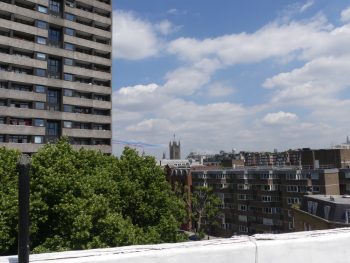We are developing the social individualist meta-context for the future. From the very serious to the extremely frivolous... lets see what is on the mind of the Samizdata people.
Samizdata, derived from Samizdat /n. - a system of clandestine publication of banned literature in the USSR [Russ.,= self-publishing house]
|
Earlier today I chanced upon Trooping the Colour on the telly, which is the big old military parade they have in London on the Queen’s “Official” Birthday. Mention was made of a flypast that was about to happen, and I immediately grabbed my camera and ran up to my roof, to photo what whatever of it that I could from there.
I had to wait a while, until 1pm. There was much helicopter activity, which seemed promising. Our Armed Forces keeping their eyes out for surface-to-air missiles, and suchlike devilry? Perhaps. Maybe just pretending to be doing that, in order to deter it. Whatever, eventually, I spied, way out beyond the multi-pointed Parliament Tower, two real airplanes, flying together. Which could only mean a flypast. No planes approaching Heathrow would ever bunch up together, like that, by which I mean like this:

That photo was taken with maximum zoom, but eventually these two airplanes trundled towards me, and I got a rather better shot of them, although still with quite a lot of zoom:

When I watched the television highlights of the show in the evening, they said that the biggest of the planes in this next photo was the biggest plane the RAF possesses:

To me, it just looks like a Boeing Dreamliner in plain clothes. Don’t they have any properly big planes? It occurs to me that the Dreamliner may be bigger than I had thought.
But at least I got to take semi-adequate photos of this dreary plane and its little sidekicks, and of its predecessor and its sidekick, above.
I had less luck with these guys:

That’s a heavily cropped close-up of them, as the Red Arrows (for it was they) vanished behind the big tower block in the middle of the square I live on the edge of, leaving only their jets of patriotic-coloured smoke.
Here is the original photo that the above is cropped from:

Which gives you an idea of how far away all this was happening, and how the direction of travel of whatever it was determined whether I would ever see it properly or not.
Unlike the earlier boring jets, the Red Arrows didn’t disappear from London in a westerly direction, i.e. past me. They went north. And this was as close to an actual photo I got of them:

I never saw anything like this:

Whch is how the Red Arrows looked on my telly.
According to that same telly, a couple of Hurricanes and a Spitfire, or maybe it was the other way around, flying in a formation, were also part of the show. But I never laid eyes or lens on them.
Nevertheless, I account the trip upstairs a success. My purpose was to see how one of these London Queen’s Birthday flypasts looked like from up on my roof, and I did. It wasn’t nearly as good as the Farnborough Air Show, but I didn’t expect it to be. It wasn’t even as good as the New Year’s Eve fireworks that I photoed from the same spot last New Year’s Eve. But then, a firework occupies a lot more sky at any particular moment than an airplane does, and its entire purpose is to be extremely visible.
I actually find it quite reassuring that the British state’s version of a ceremonial flypast over its capital city is so very modest, and that by far its most impressive moment features guys who are basically aerial ballet dancers.
The left are about intentions. They treat their own good intentions as evidence they will do good – and that we, who oppose them, have evil intentions. We notice incentives. If the planned road to utopia rewards freeloading while punishing those who pay for it, it will not get there.
“Why did I bother!” is what Natalie’s exasperated neighbour said when the Tory manifesto came out. That neighbour is one of the goodies: never rich but she paid her way (plus taxes), raised her kids, worked at many a humble low-paying job (as her neighbours’ cleaned kitchens could testify) and ends up with a house, a life she can respect, and no other major assets. May’s intention was presumably to balance the budget. But taking that neighbour’s house to pay alike for her care and freeloaders’ care incentivised her to demand, “Why did I bother!”
Theresa May was stuffing envelopes for the Tory party when she was twelve years old. But maybe that’s the problem. Given my family background, it is mere lucky chance I was not stuffing envelopes for Labour at that age. Almost 5 years separated my reaching voting age from the next general election – which is why I can tell you I have never voted Labour. I had to work out, as the years and days to that first election ticked down, why I should not do what I would have done on my 18th birthday. That is why, today, I could not look at a policy proposal without the thought occurring, “What incentives will this create?” Evidently, Theresa May can.
[ADDED LATER: should Natalie’s neighbour have been so exasperated? My thoughts are here.]
We don’t even know how many souls perished in the Grenfell Tower inferno, and yet already they are being marshalled to party-political ends. Already Labour-leaning commentators and campaigners are using them, using the freshly dead and the unspeakable horrors they experienced, to make mileage for their party, to brand the Tories evil and Jeremy Corbyn saintly. In the 20 years I’ve been writing about politics, I can’t remember a national tragedy being exploited for party-political gain so quickly. The time between a calamity occurring and the use of it to harm one’s political enemies and fortify one’s political allies is shrinking all the time. It’s now mere hours, minutes even, courtesy of social media
– Brendan O’Neill
Politics Home reports,
Jeremy Corbyn: State should seize ‘luxury’ properties to help those left homeless by Grenfell blaze
The Labour leader said ministers must “requisition” the houses to make sure those affected by the tragedy can still live locally.
He spoke out as MPs met for the first time to debate the aftermath of the inferno, which has so far left 17 people dead with the number of fatalities expected to rise considerably.
[…]
“The ward where this fire took place is, I think, the poorest ward in the whole country and properties must be found – requisitioned if necessary – to make sure those residents do get re-housed locally.
“It can’t be acceptable that in London we have luxury buildings and luxury flats left empty as land banking for the future while the homeless and the poor look for somewhere to live. We have to address these issues.”
In case you were wondering, the people made homeless by the Grenfell Tower fire are not going to be turfed out on the street. They will be rehoused by Kensington & Chelsea Council, in accordance with its statutory obligations. Mr Corbyn knows this perfectly well. The point of his remark was not to help these people but to use them as disposable weapons in his quest to breach the principle of secure property rights under law.
Socialists always start by seizing the property of the rich to give to the poor, because that’s where the votes are. They always end by seizing the property of the poor to give to the rich, because that’s where the money is.
Consider the People’s Republic of China:
From 2006:The big steal
In this and countless other cases, the spark for the conflict was the same: land seizures that made local officials rich and left dispossessed peasants fuming about injustice. This is the dark side of China’s spectacular economic development. In a shocking admission earlier this year, the director of law enforcement in the Land Ministry, Zhang Xinbao, said there have been more than a million cases of illegal land use in the past six years. Sometimes it is little more than armed robbery as police and gangsters use force to drive people off their property. More often, it is fraud, when local officials – bribed by developers – cheat the farmers of fair compensation.
From 2010: China violence over property seizures
Vehicles burn after hundreds of Chinese villagers battled with local police over a land seizure in Zhaotong, in southwest China’s Yunan province on November 2, 2010. Land seizures are frequently reported in China as officials and businesses seek to cash in on a property boom and forcibly remove residents to make way for new buildings or infrastructure projects.
Once the rule of law is breached, it is hard to fix again. Property rights are needed more by the poor than the rich. The rich have other resources.
Alison Hernandez was a little too open to new ideas:
Civilian gun owners could help fight terror attacks, police commissioner suggests
A police commissioner has suggested that civilians with gun licences could be allowed to use private weapons to defend their community against terrorists, in comments that have been rejected by a senior officer.
Alison Hernandez, the police and crime commissioner for Devon and Cornwall, said “I’d really be interested in exploring that” and “let’s officially have a look at that” when a caller suggested the idea during a radio phone-in.
She said she was interested in having a conversation with her chief constable to “see what would be the implications of it”.
However, her comments led to a warning from a senior officer that citizens should not arm themselves and the force said that armed civilians could be caught in the crossfire.
Deputy Chief Constable Paul Netherton told the BBC it was “definitely an emphatic ‘no'” that people should be arming themselves against such a threat.
A Police and Crime Commissioner is “an elected official in England and Wales charged with securing efficient and effective policing of a police area”, rather than an actual police officer, so do not be misled into thinking that openly expressed crimethink has reached the police. But it has reached people who officially talk to the police.
I believe economics, and the way economics has shaped society in the past 15-20 years, plays a major role. Sure the young Corbyn supporter doesn’t understand economics, but point me towards a demographic that does. Every government in every western country is staring down the barrel of ballooning deficits, a debt which will take millenia to pay off, and not a single major party anywhere wants to even talk about it, let alone do anything about it. A simple reduction in planned expenditure increase is dressed up as a savage cut by damned near everyone: the Tories’ supposed austerity isn’t some fringe issue on the left, it is a widely accepted truth across the whole electorate. The people pointing out that these cuts are anything but are basically a handful of cranks on the internet. Like, erm, me. If any government program is threatened with a cut taking expenditure levels back to what they were in, say, 2010 half the country screams that medieval times are making a comeback and the other half believe them. The knowledge of economics among electorates is woeful, and almost all of them have signed up fully to the belief that all government expenditure is necessary, good, and wise and any cuts are bad. Nobody wants to even think about the size of the deficit and the national debt, it just keeps racking up. So if we’re going to criticise the young Corbynistas for not understanding the consequences of unsustainable economics demanded by ignorant voters, we might perhaps want to first ask where they got such ideas from. It’s too easy to blame Marxist indoctrination in schools when supposedly conservative governments, backed fully by the supposedly conservative middle classes, have been so irresponsible with public finances for several generations. Conservative governments might not be quite as reckless as Corbyn would be, but we’re talking about the difference between disaster and a catastrophe here.
– Tim Newman
The Conservative party gave me absolutely nothing in their manifesto that would make me inclined to vote for them. They have done nothing while they have been in power that would make me inclined to vote for them. The only thing that they had going for them was that they were not Labour. As far as I can see, the hung parliament is a result of his party being utterly rubbish and running an utterly rubbish campaign. They took the electorate for granted when they sowed and this election result is just what they deserved to reap.
– Commenter Stonyground remarking over on Longrider. This strikes me as a near perfect and succinct summation of why the Stupid Party was almost defeated by the Evil Party.
Personally I supported the idea of the election, but even given my loathing of Theresa May, I was stunned by how badly May came across during the campaign, snatching near defeat from the jaws of victory.
Guy Herbert: Theresa May proven worse than cancer. It is a fine slogan
Perry de Havilland: Guy’s remark needs to be SQOTD
Guy Herbert: Along with my NHS slogan I hope: “Better than Greece”
Like most of my fellow Samizdata contributors, I imagine, I am watching the election results in the UK and the projections from exit polls suggesting that the Tories may not even have a working majority. And about 10 days or so before the full, formal negotiation process is due to start over the UK departure from the European Union.
It is a non-trivial possibility that Brexit may either not happen or at all, or take a form on such a humiliating basis that it is not really a departure from the EU at all.
As already noted, the idea that it was smart strategy for the Tories to pursue a centrist, pre-Thatcherite, interventionist agenda, was always dumb. Not least because to make a positive case, it was necessary to stress the pro-enterprise case for leaving the EU, rather than simply promising to introduce the very kind of dirigiste policies that the UK was supposed to be freeing itself from by leaving. Mrs May, does not have it in her to make a positive case.
It has come to this: a party led by Jeremy Corbyn, Marxist, hater of Israel, cheerleader for the IRA, Hamas, and a foe of open markets and the West in general could be close to holding power in a few days’ time. I seriously hope I am wrong. But whatever happens, I think it is highly probable that May may not be in Downing Street for very long.
The main political insight of Thatcher and Reagan was that parties of the center-right must be parties of economic growth. Having wavered since, those parties now risk losing their way entirely. Some centrists will argue, quirks of this campaign notwithstanding, that Mrs. May shows how to win an election. The important question for conservatives to ask is: To what end?
– Joseph C. Sternberg, Wall Street Journal (behind a paywall)
We happily say ‘Christian fundamentalist’ about people who are Christian and fundamentalist. We use ‘Buddhist extremists’ to describe violent Buddhist groups in Myanmar. And yet Islam is ringfenced from tough discussion; phrases which at some level include the word ‘Islam’ are tightly policed; criticism of Islam is deemed a mental illness: Islamophobia.
This is incredibly dangerous. This censorious flattery of Islam is, in my view, a key contributor to the violence we have seen in recent years. Because when you constantly tell people that any mockery of their religion is tantamount to a crime, is vile and racist and unacceptable, you actively invite them, encourage them in fact, to become intolerant. You license their intolerance. You inflame their violent contempt for anyone who questions their dogmas. You provide a moral justification for their desire to punish those who insult their religion.
– Brendan O’Neill
One probable outcome of the emergence of knife wielding jihadis on British streets will be an increase in British people arming themselves as well. Of course, this will be treated as a bigger threat than the jihadis by the state, but one might speculate how many unarmed people would have been killed and wounded if the jihadis had not chosen to attack in well protected central London but rather some part of the country where armed policeman are few and far between.
|
Who Are We? The Samizdata people are a bunch of sinister and heavily armed globalist illuminati who seek to infect the entire world with the values of personal liberty and several property. Amongst our many crimes is a sense of humour and the intermittent use of British spelling.
We are also a varied group made up of social individualists, classical liberals, whigs, libertarians, extropians, futurists, ‘Porcupines’, Karl Popper fetishists, recovering neo-conservatives, crazed Ayn Rand worshipers, over-caffeinated Virginia Postrel devotees, witty Frédéric Bastiat wannabes, cypherpunks, minarchists, kritarchists and wild-eyed anarcho-capitalists from Britain, North America, Australia and Europe.
|










